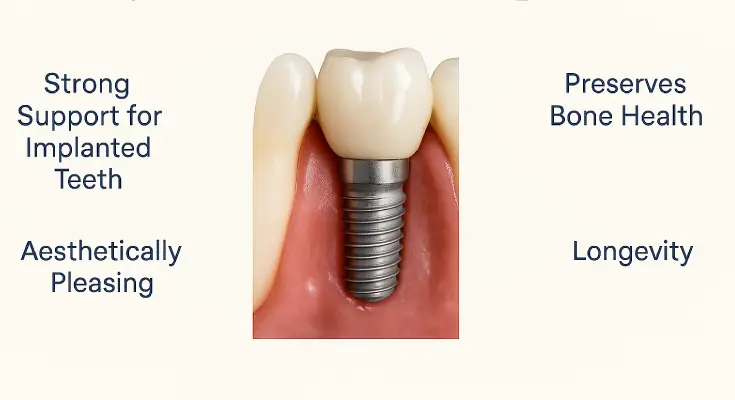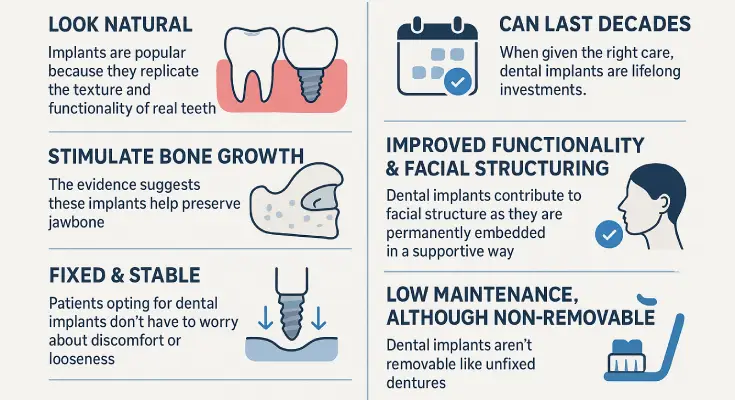Dental Implant Care in NYC: How to Make Your Investment Last
The dental implant costs in NYC may raise eyebrows of potential patients. At 65 Broadway Dental, we see this procedure as an investment, not an expense! Many patients also ask about insurance coverage for dental implants in NYC, which can help make treatment more affordable
After dental implant procedures, dentists and periodontists will suggest dental implant care tips. When followed, they ensure the implants heal and remain in good, long-lasting condition.
What are Dental Implants?
Dental implants are metal screws put into the jawbone and covered by an artificial crown. A connection, called the abutment, ties the crown to the implant.
The visible crown is made from material shaped and colored to mimic real teeth. This dental option falls under the purview of cosmetic dentistry. Patients often compare implants with other cosmetic options, such as veneers vs bonding, to see which treatment best matches their needs in terms of aesthetics and durability.
Dental implants are a popular option for filling gaps left by many lost teeth. Implants that replicate natural roots support these false teeth.
How Dental Implants Work
It begins by inserting artificial roots (implants) into the patient’s jawbone. Before this, a dental checkup allows for measurements and checks jawbone density.
Afterwards, dentists attach the connector piece (abutment), which connects implants and crowns. The crown, which is the outermost level of a dental implant, will fit onto the abutment.
Opting for same-day dental implants in NYC makes the duration of the procedure one day! Dentists fit permanent crowns after fusion of the implant with the jawbone.
What Factors Determine the Cost of Dental Implants?
Implant costs differ due to qualities, and their specifics determine the cost difference.
- Number of Implants Needed
The costs are likely to increase with the number of teeth needing replacement. So, you’ll find it more affordable to replace a tooth instead of a full arch. - Grade & Quality of Materials
Lasting and durable materials come at a higher cost compared to less durable ones. It gives materials like Titanium a premium price compared to ceramics and Zirconia. - Restoration Type
Personal preferences for crowns, bridges, or implants will affect the final cost. - Extra Treatments
If other treatments are needed during the implant procedure, costs will change. Some examples of these treatments are bone grafts, tooth extractions, or sinus lifts.
- Dentist Experience
Extensive dental experience also plays a role in increasing a patient’s final bill! The more experienced the dentist, the higher the costs are likely to be.
Why Choose Dental Implants?
Dental implants are among the first choices for replacing missing teeth. Not only does this restore teeth and aesthetics, but it restores confident smiles. Other reasons to consider dental implants over other treatments are:

Strong Support for Implanted Teeth
Implants fixed into the jawbone benefit from the firm support given by the bone. Traditional bridges use surrounding teeth for support, and these teeth may need adjustments. Dentures can be removable or fixed (using adhesives), but neither provides solid support.
Zygomatic dental implants, which embed implants in the cheekbone, provide more support.
Aesthetically Pleasing
Dental implants also emerge as aesthetically appealing dental solutions for missing teeth. These artificial teeth let dentists create custom teeth that replicate real ones. These teeth also provide comfort that alters the quality of life for the better.
Preserves Bone Health
The dental implant procedure is accompanied by bone health preservation. This procedure encourages preservation, reducing bone loss after teeth are lost.
Longevity
Experts design implants to survive decades with correct dental implant care. Alternatives need replacement after 5-10 years, making dental implants appear more permanent.
Are There Any Alternatives to Dental Implants?
There are other options to dental implants, but their effectiveness differs. Two options available to patients seeking teeth replacement are dentures and bridges.
Dentures
These artificial appliances are an affordable solution, although they lack aesthetics and support. They’re not as comfortable as other permanent solutions when it comes to lengthy usage. These non-surgical dentures are false teeth that close gaps left by tooth loss.
Bridges
People who need a surgery-free option can choose bridges over dental implants. These appliances don’t need surgery but require permanent alterations to neighboring teeth. Even if neighboring teeth are healthy, they will need to be filed to accommodate the new bridge. Teeth surrounding the bridge will provide support, and this requires them to change.
Anyone struggling with the implant-supported bridge vs dentures debate can compare the two.
Golden Rules & Healing Timeline for Long-Lasting Dental Implant Care
Taking care of your dental implants isn’t complicated, but it does take a little patience and consistency. At 65 Broadway Dental, we like to remind patients that healing is more of a journey than a race. If you follow these golden rules and understand what to expect during recovery, your implants can stay strong for many years, maybe even a lifetime.
1. Don’t Skip Your Dental Checkups
Think of your dentist as your implant’s “coach.” Regular visits give your dentist a chance to see how the healing is going, catch small problems early, and make sure your implant stays on track. Even if you feel fine, these checkups are important because some implant issues show no pain until they become serious.
2. Know What to Expect During Healing
Your mouth heals in phases, and each one needs a slightly different approach. Being prepared helps you avoid frustration and makes recovery smoother.
Week 1: The Rest Stage
- Eat soft foods like yogurt, mashed veggies, or warm soup. Anything you can cut with a spoon is safe to eat.
- Avoid smoking and alcohol, since they slow down healing and can increase the risk of infection.
- Rinse gently with the mouthwash your dentist gave you. Don’t swish hard; just let it move around your mouth lightly.
- Take it easy and rest. Your body needs energy to heal.
Weeks 2–4: Growing Stronger
- Pain and swelling usually calm down at this stage.
- Slowly add foods like scrambled eggs, pasta, and steamed vegetables.
- Use a toothbrush with soft bristles to gently clean around the implant site.
- Avoid missing your follow-ups, as your dentist will see that the implant is stable and on the mend.
Months 1–3: The Implant “Settles In”
- Your implant starts bonding with your jawbone, a process called osseointegration. This is what makes implants so strong.
- You can eat most foods again, but avoid really hard foods like nuts, hard candy, and sticky treats that could put stress on the implant.
- Brush twice daily and floss once daily. Oral hygiene at this stage is crucial for long-term success.
- Avoid bad habits like chewing ice, biting your nails, or using your teeth to open packages. These harm both implants and natural teeth.
After 3 Months: Back to Normal
- Your crown (the visible tooth part) is usually in place, and your implant feels just like a natural tooth.
- You can now eat, speak, and smile.
- With good care and regular checkups, your implant has the ability to last a lifetime.
3. Brushing & Flossing Daily
Dental implants may be safe from cavities, but the gums and bone surrounding them can get infected with poor care. Brushing twice a day and flossing daily to maintain oral health. Your dentist may recommend using a water flosser to clean those difficult areas near your implants.
4. Use Suitable Dental Care Items
Implants are at risk when using harsh dental products. Your dentist will recommend using:
- A toothbrush with soft bristles to prevent irritation
- Low-abrasive toothpaste to protect the surface of the crown
- Special implant-safe floss or a water flosser for easy cleaning
These small changes in your routine can make a big difference.
5. Say No to Smoking & Limit Alcohol
Smoking and alcohol don’t just slow healing; they also increase the risk of implant failure. Tobacco restricts blood flow to your gums, making it harder for your mouth to recover. Alcohol can dry out your mouth and stain your crown. For the best long-term results, avoid both, especially during the first six months.
6. Eat Smartly While Recovering
Food is essential in determining how quickly your mouth heals. Initially, stick with soft, easy-to-chew foods like mashed potatoes, smoothies, eggs, oatmeal, or soup. When your implant has healed, you can reintroduce more foods, but be cautious with hard or sticky items. Think of your diet as fuel; healthy foods will help your gums and bones heal faster.
Why Dental Implants are a Long-Term Investment
Dental implants are quickly becoming the preferred way of replacing missing teeth. Several qualities back up the return on investment these implants provide.

Look Natural
Implants are popular because they replicate the texture and functionality of real teeth. Alternatives like dentures struggle in aesthetics, leaving wearers feeling insecure and less confident.
Can Last Decades
When given the right care, dental implants are lifelong investments. They can last decades, and depending on the age you receive them, you won’t need to change them.
Stimulate Bone Growth
The evidence suggests these implants help preserve jawbone by encouraging the surrounding bone.
Improved Functionality & Facial Structuring
Dental implants contribute to facial structure as they are permanently embedded in a supportive way. They help remove empty spaces in core structural positions. Compared to other appliances, they restore maximum functionality, improving the quality of life.
Fixed & Stable
Patients opting for dental implants don’t have to worry about discomfort or looseness. Dental implants are embedded in the jawbone and supported well. After healing, dental implant patients can enjoy the same activities that people without missing teeth do.
Low Maintenance, Although Non-Removable
Dental implants aren’t removable like unfixed dentures. But that doesn’t mean you cannot clean them well. Adhering to a brushing and flossing routine will adequately ensure optimal maintenance.
Who Are Ideal Candidates for Dental Implants?
Certain patients make the best candidates for dental implants, as their qualities lead to higher success rates. While other criteria would disqualify patients for this specific dental procedure:
- People who have exceptional jawbone density
- No recent tooth loss
- Good overall health
- Dedication toward oral hygiene
- Don’t smoke or have recently quit
Certain conditions disqualify patients for this procedure, including:
- Gum disease
- Severe jawbone loss
- Severe diseases (like uncontrolled diabetes)
- Poor oral hygiene
- A long history of smoking habits
- Radiation therapy patients
Also Read
Conclusion
Sticking to a dental implant care routine is essential to ensure they last longer. Having good oral hygiene is necessary to help post-implant patients avoid infections and diseases. 65 Broadway Dental recommends dental implants as they can remain functional for decades!
FAQs
1. Why is it important to follow dental implant care after surgery?
Failing to follow the dentist’s advice can affect your healing abilities and duration. Extended healing or issues during the healing process can affect quality of life. It’s vital to listen to dentists and follow their instructions for as long as needed.
2. What are the symptoms of implant failure?
Common symptoms that point to complications are swelling, looseness, bleeding, or visible damage. Implant patients should consult a dentist if they experience any of those symptoms.
3. Can I eat and drink whatever I want after getting dental implants?
Patients must control their eating and drinking to align with dental implant care. The first edible items shouldn’t require any chewing, such as soups. After a few weeks, patients can eat soft foods that need minimal chewing.
4. What is peri-implant disease?
There are two forms of peri-implant disease. Peri-implant mucositis and Peri-implantitis are two ways the tissues surrounding implants become infected.
5. Can I get a single-tooth dental implant in a day?
Yes, you can, but laying of the permanent crown happens after healing (3 to 6 months).

Dr. Alexander Heifitz (Author)
Dr. Alexander Heifitz is the founder of 65 Broadway Dental in NYC, where he combines advanced dental expertise with a patient-first approach. He specializes in cosmetic and restorative treatments such as dental implants, veneers, Invisalign, and smile makeovers, helping New Yorkers achieve both oral health and confidence.
Booking An Appointment
Looking for a reliable dentist in Downtown NYC? Whether you need a routine cleaning, urgent care, or a full smile transformation — we’ve got you covered. We accept most PPO insurance plans and offer flexible scheduling.
+1 (212) 430-3888
Call for appointment
Walk-ins Welcome / Same-Day Appointments Available

Related Blogs

The Best Way to Whiten Your Teeth: Proven Methods That Actually Work
Discover the best ways to whiten your teeth safely. Learn proven methods, dentist-recommended treatments, and tips to get a brighter, long-lasting smile.
Read More
Does Baking Soda Whiten Teeth? The Complete Evidence-Based Answer
Discover how baking soda can naturally brighten teeth, what results to expect, and the science behind its whitening effect.
Read More